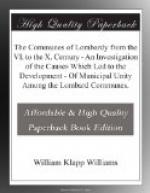That the influence of the bishop in affairs of state at this period was only of an individual, extra-official character can be seen also from the fact that the king considered the bishops themselves to be under his judicial jurisdiction in all secular matters, just as the lesser clergy came under the jurisdiction of the judices:[81] and further, that after the election to a church, the decision of the judex must confirm the choice of the community in order to render it valid.[82] All disputes also between bishops and their clergy, between members of the body of clergy, and between these and members of the laity, were settled by the royal authority;[83] and what is most significant, there was a universal and freely used right of appeal for the clergy or laity from the decision of a bishop to the person of the king, who seems to have exhibited no hesitation in modifying or reversing sentences, even in matters relating to purely clerical discipline.[84]
Even in the time of the Franks, when the consideration shown to the church and its representatives was much greater than under any of the Lombard kings, we find Charlemagne,[85] on suspicion of infidelity to his government, having sent to him and retaining as prisoners the bishops “Civitatis Pisanae seu Lencanae” and Pottoni, Abbot of the monastery of Volturno; and Lewis the Pious[86] sends into exile “Ermoldo Nigello Abatis,” and in the year 818 several other bishops, including Anselmus “Mediolanensis Archiepiscopus,” “Wolfoldus Cremonensis” and “Theodolphus Amelianensis."[87] None of these restrictions and limitations, however, although they arose chiefly from the strong opposition always existing between the local temporal rulers of the people and their spiritual rulers, could hinder the bishops from occupying that important position of mediators and of protectors of the people which we have ascribed to them.
Turning now to a consideration of the earliest steps which may be said to have cleared the way for the political power of the bishops, we are met by a subject which, though of great interest in itself, is not sufficiently a part of this investigation for us to do more than indicate the lines of its progress. This subject is the development of the practice of giving certain immunities and privileges to churches and monasteries, adopted by the Frankish kings, faithful sons of the church, and then followed by all their royal and imperial successors. In considering the important influence exercised by these immunities on the development of the espiscopal power and the effects of this on the growth of the communes, there are two essential facts which we must always keep prominently in mind. In the first place we must remember that the granting of immunities was a question of privilege to particular individuals or ecclesiastical institutions, and not a universal grant which affected in an equal degree all the dioceses of the realm. This led to the marked differences in rank and importance




